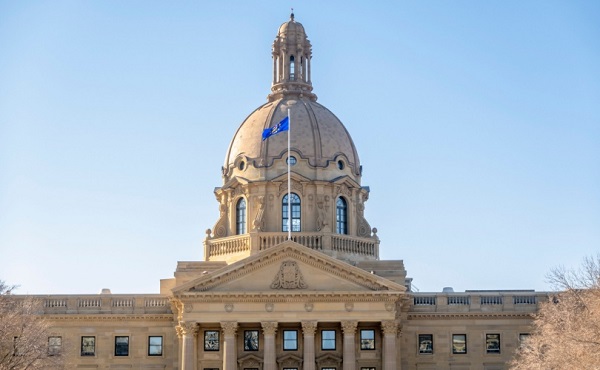Alberta
Province pumps healthcare system – $100M boost for surgical suites, equipment, rural hospitals

From the Province of Alberta
A $100-million government investment will help hospitals across the province upgrade their operating rooms to provide thousands more surgeries to Albertans.
Large-scale renovations and some new operating rooms in Edmonton, Calgary, Grande Prairie and Lethbridge will allow those hospitals to focus on providing more complex surgeries, leaving rural sites and chartered surgical facilities to provide additional lower risk surgeries.
“Albertans deserve a world-class health system that delivers the right care, in the right setting, at the right time. This funding from Budget 2020 will drive down wait times with necessary and overdue upgrades to hospital operating rooms and equipment across the province. Ultimately, we will make sure our health-care system has the capacity and the staff to deliver the best access to surgery in Canada.”
“This is great news for Albertans who need surgeries and want more access to quality health care in their home communities. This $100 million for capital projects will have a cascading effect, improving access to surgeries in big city hospitals, but also in rural communities across the province, so people can get care closer to home. It’s just the start of our government’s commitment to ensure the success of the Alberta Surgical Initiative. We are working exceptionally hard to ensure we build the best health system possible in this wonderful province.”
This capital funding is part of the government’s $500-million commitment in Budget 2020 to drive down wait times and provide all medically necessary surgeries within clinically appropriate times. Savings found through the AHS Reviewwill support this initiative.
The $100 million in capital funding will be spent on surgical infrastructure and equipment, including:
- Upgrades to 12 operating rooms at Calgary’s Foothills Medical Centre. Low-risk surgeries will be moved out of the Foothills hospital and offered in Canmore, High River and independent surgical facilities in Calgary, relieving pressures on city hospitals with long wait lists.
- A fit-out of an operating room in Grande Prairie and converting space in the Edson Health Centre into a second operating room.
- Renovations at the Rocky Mountain House Health Centre so it can perform more endoscopy procedures and create more space in the Red Deer hospital to focus on more complex surgeries. Low-risk surgeries will also be moved out of the Red Deer Hospital to be offered in Innisfail, Stettler, Ponoka and Olds.
- Renovations to operating departments at the Royal Alexandra Hospital and the University of Alberta Hospital, including the addition of one new operating room. Lower risk procedures will be moved to the Fort Saskatchewan Health Centre, the Grey Nuns Community Hospital and the Sturgeon Community Hospital in St. Albert.
- Renovations at the Medicine Hat Regional Hospital.
- Combining two smaller operating rooms into one larger space for more complex surgeries at Lethbridge’s Chinook Regional Hospital.
This capital investment will help AHS add over 17,000 surgeries this fiscal year to meet the four-year target that was set. Once the renovations are complete and less complex surgeries are being performed in chartered surgical facilities, up to 30,000 additional surgeries will be available to Albertans by 2023.
Alberta
B.C. would benefit from new pipeline but bad policy stands in the way

From the Fraser Institute
By Julio Mejía and Elmira Aliakbari
Bill C-69 (a.k.a. the “no pipelines act”) has added massive uncertainty to the project approval process, requiring proponents to meet vague criteria that go far beyond any sensible environmental concerns—for example, assessing any project’s impact on the “intersection of sex and gender with other identity factors.”
In case you haven’t heard, the Alberta government plans to submit a proposal to the federal government to build an oil pipeline from Alberta to British Columbia’s north coast.
But B.C. Premier Eby dismissed the idea, calling it a project imported from U.S. politics and pursued “at the expense of British Columbia and Canada’s economy.” He’s simply wrong. A new pipeline wouldn’t come at the expense of B.C. or Canada’s economy—it would strengthen both. In fact, particularly during the age of Trump, provinces should seek greater cooperation and avoid erecting policy barriers that discourage private investment and restrict trade and market access.
The United States remains the main destination for Canada’s leading exports, oil and natural gas. In 2024, nearly 96 per cent of oil exports and virtually all natural gas exports went to our southern neighbour. In light of President Trump’s tariffs on Canadian energy and other goods, it’s long past time to diversify our trade and find new export markets.
Given that most of Canada’s oil and gas is landlocked in the Prairies, pipelines to coastal terminals are the only realistic way to reach overseas markets. After the completion of the Trans Mountain Pipeline Expansion (TMX) project in May 2024, which transports crude oil from Alberta to B.C. and opened access to Asian markets, exports to non-U.S. destinations increased by almost 60 per cent. This new global reach strengthens Canada’s leverage in trade negotiations with Washington, as it enables Canada to sell its energy to markets beyond the U.S.
Yet trade is just one piece of the broader economic impact. In its first year of operation, the TMX expansion generated $13.6 billion in additional revenue for the economy, including $2.0 billion in extra tax revenues for the federal government. By 2043, TMX operations will contribute a projected $9.2 billion to Canada’s economic output, $3.7 billion in wages, and support the equivalent of more than 36,000 fulltime jobs. And B.C. stands to gain the most, with $4.3 billion added to its economic output, nearly $1 billion in wages, and close to 9,000 new jobs. With all due respect to Premier Eby, this is good news for B.C. workers and the provincial economy.
In contrast, cancelling pipelines has come at a real cost to B.C. and Canada’s economy. When the Trudeau government scrapped the already-approved Northern Gateway project, Canada lost an opportunity to increase the volume of oil transported from Alberta to B.C. and diversify its trading partners. Meanwhile, according to the Canadian Energy Centre, B.C. lost out on nearly 8,000 jobs a year (or 224,344 jobs in 29 years) and more than $11 billion in provincial revenues from 2019 to 2048 (inflation-adjusted).
Now, with the TMX set to reach full capacity by 2027/28, and Premier Eby opposing Alberta’s pipeline proposal, Canada may miss its chance to export more to global markets amid rising oil demand. And Canadians recognize this opportunity—a recent poll shows that a majority of Canadians (including 56 per cent of British Columbians) support a new oil pipeline from Alberta to B.C.
But, as others have asked, if the economic case is so strong, why has no private company stepped up to build or finance a new pipeline?
Two words—bad policy.
At the federal level, Bill C-48 effectively bans large oil tankers from loading or unloading at ports along B.C.’s northern coast, undermining the case for any new private-sector pipeline. Meanwhile, Bill C-69 (a.k.a. the “no pipelines act”) has added massive uncertainty to the project approval process, requiring proponents to meet vague criteria that go far beyond any sensible environmental concerns—for example, assessing any project’s impact on the “intersection of sex and gender with other identity factors.” And the federal cap on greenhouse gas (GHG) emissions exclusively for the oil and gas sector will inevitably force a reduction in oil and gas production, again making energy projects including pipelines less attractive to investors.
Clearly, policymakers in Canada should help diversify trade, boost economic growth and promote widespread prosperity in B.C., Alberta and beyond. To achieve this goal, they should put politics aside, focus of the benefits to their constituents, and craft regulations that more thoughtfully balance environmental concerns with the need for investment and economic growth.
Alberta
Alberta introduces bill allowing province to reject international agreements

From LifeSiteNews
Under the proposed law, international treaties or accords signed by the federal government would not apply in Alberta unless approved through its own legislation.
Alberta’s Conservative government introduced a new law to protect “constitutional rights” that would allow it to essentially ignore International Agreements, including those by the World Health Organization (WHO), signed by the federal Liberal government.
The new law, Bill 1, titled International Agreements Act and introduced Thursday, according to the government, “draws a clear line: international agreements that touch on provincial areas of jurisdiction must be debated and passed into law in Alberta.”
Should the law pass, which is all but certain as Alberta Premier Danielle Smith’s Conservatives hold a majority government, it would mean that any international treaties or accords signed by the federal government would not apply in Alberta unless approved through its own legislation.
“As we return to the legislature, our government is focused on delivering on the mandate Albertans gave us in 2023 to stand up for this province, protect our freedoms and chart our path forward,” Smith said.
“We will defend our constitutional rights, protect our province’s interests and make sure decisions that affect Albertans are made by Albertans. The federal government stands at a crossroads. Work with us, and we’ll get things done. Overstep, and Alberta will stand its ground.”
According to the Alberta government, while the feds have the “power to enter into international agreements on behalf of Canada,” it “does not” have the “legal authority to impose its terms on provinces.”
“The International Agreements Act reinforces that principle, ensuring Alberta is not bound by obligations negotiated in Ottawa that do not align with provincial priorities,” the province said.
The new Alberta law is not without precedent. In 2000, the province of Quebec passed a similar law, allowing it to ignore international agreements unless approved by local legislators.
The Smith government did not say which current federal agreements it would ignore, but in theory, it could apply to any agreement Canada has signed with the United Nations or the WHO.
-

 Business19 hours ago
Business19 hours agoTrans Mountain executive says it’s time to fix the system, expand access, and think like a nation builder
-

 Business1 day ago
Business1 day agoCarney government risks fiscal crisis of its own making
-

 Alberta1 day ago
Alberta1 day agoB.C. would benefit from new pipeline but bad policy stands in the way
-

 Energy19 hours ago
Energy19 hours agoCAPP calls on federal government to reset energy policy before it’s too late
-

 Frontier Centre for Public Policy2 days ago
Frontier Centre for Public Policy2 days agoChurches Are All That Stands Between Canada And Tyranny
-

 Alberta1 day ago
Alberta1 day agoAlberta introduces bill allowing province to reject international agreements
-

 Business2 days ago
Business2 days agoTrump Admin Establishing Council To Make Buildings Beautiful Again
-

 Media12 hours ago
Media12 hours agoCarney speech highlights how easily newsrooms are played by politicians announcing the same things over and over again




